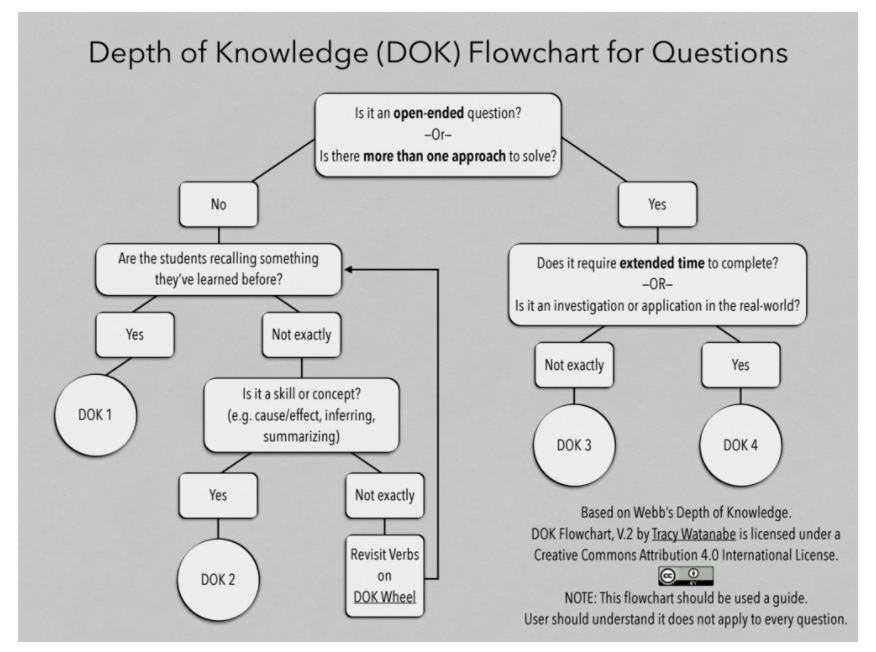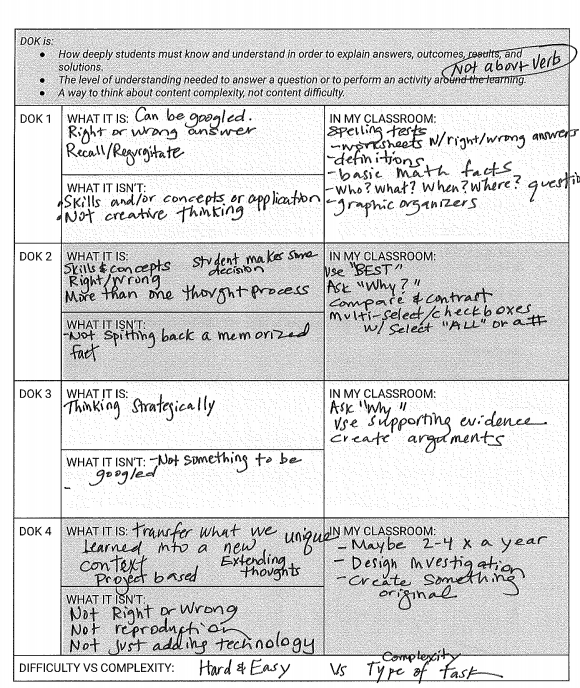Now that you understand what Depth of Knowledge (D.O.K.) is and isn’t and you know there are no quick answers or graphics to categorize according to the 4 levels, what might you do next? Below are some suggestions to help with your process without requiring a large time commitment. Please, don’t get stuck determining an exact level for each task you assign. Instead, focus on exposing students to a variety of levels. Be intentional.
To better understand the four levels, watch DOK Fork 2, a 4-minute video using a fork to go through Levels 1 – 4.
1. Self-Check.
Keep tally marks on a basic table to track the levels of asked questions, assigned homework and classwork, and projects.
 It is common to struggle to classify a task between two different levels. One approach to work through this is to engage in conversations with a peer in an attempt to reach a consensus. Also, common advice is to round up to the higher level when in doubt.
It is common to struggle to classify a task between two different levels. One approach to work through this is to engage in conversations with a peer in an attempt to reach a consensus. Also, common advice is to round up to the higher level when in doubt.
Below is a flowchart created by Tracy Watanabe to help with categorizing D.O.K. levels. This is not intended to work in every situation.

There is no magical distribution of the levels. I have found that being told I have to do a certain number of something is too confining and not being told a certain number is too loose. Within this topic, the best answer to how many tasks at each level should be taught is based on your professional judgment combined with knowing all students deserve to have access to all 4 levels.
Spend time analyzing your results, then consider redesigning the work to a different D.O.K. level if you see a need.
2. List Lessons.
Take time to list specific lessons you currently use at each DOK level. DOK Lessons
 3. Ask Questions.
3. Ask Questions.
Keep a list of the questions below in an area you frequently visit. The goal is to keep active the process of becoming more D.O.K. informed and intentional.
- What level of work are the students most commonly required to perform?
- What is the complexity of the task(s) rather than the difficulty?
- What are the skills and knowledge students will need to have to complete the task(s)?
- Do I hit all levels of D.O.K. for all students?
- What levels are indicated in the standards by the tasks demanded?
- At what DOK level do I spend most of my instructional time with students?
- Are all DOK levels equally important?
- Have my lessons, projects, tests, etc. changed to align with the latest Indiana Academic Standards?
- What barriers keep me from creating lessons with deeper thought processes?
There is no formulaic guide to the process and self-assessment of this professional learning. It is a growing process that takes time and practice. To be clear, the work is hard. If you need someone to give you some basic starting steps, I would suggest:
- Start with the standard and identify the D.O.K. of the standard.
- Design questions, tasks, and assessments that align with step 1.
- Address difficulty levels within step 2 to differentiate for student needs.
Resources
Please login or register to claim PGPs.
Alternatively, you may use the PGP Request Form if you prefer to not register an account.



